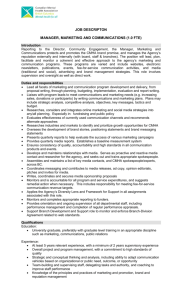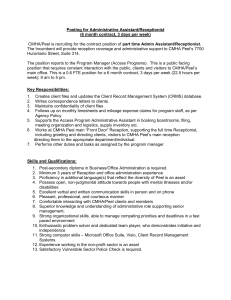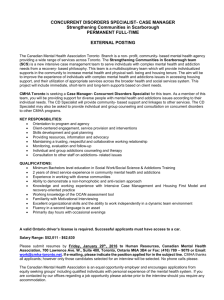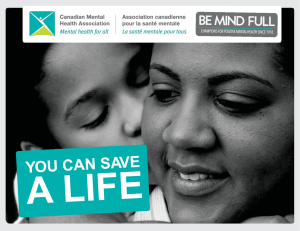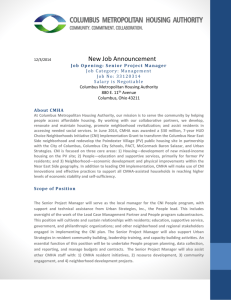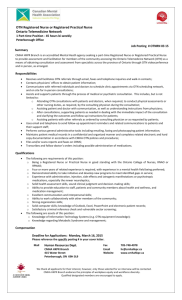Customer Services Handbook - Gogebic Community Mental Health
advertisement
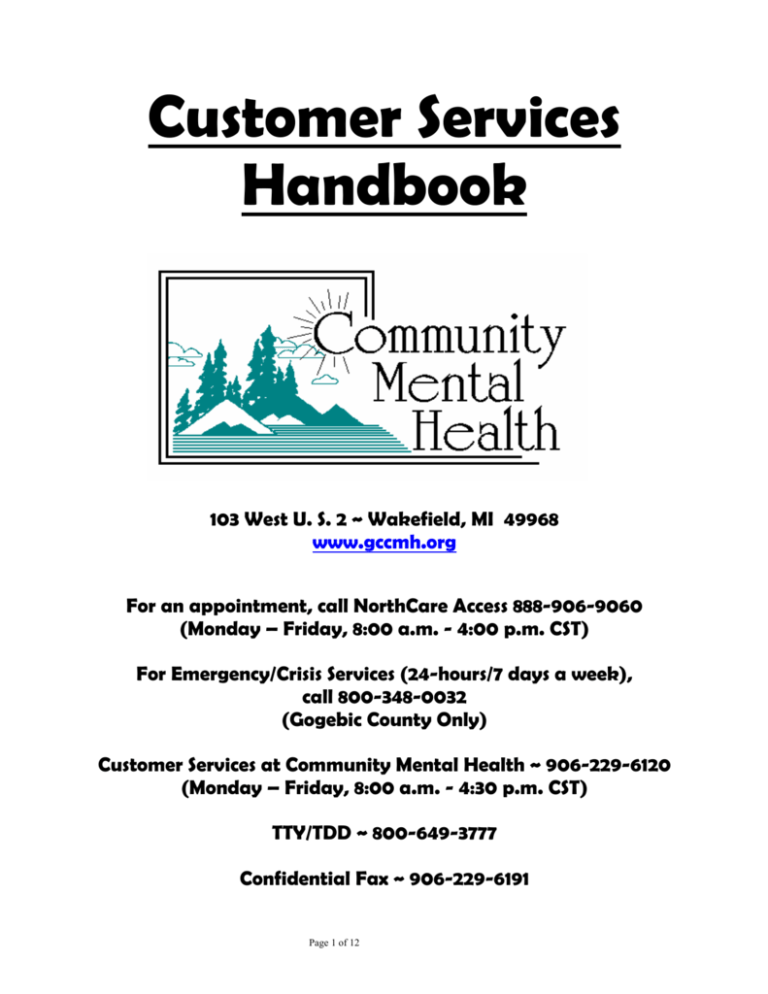
Customer Services Handbook 103 West U. S. 2 ~ Wakefield, MI 49968 www.gccmh.org For an appointment, call NorthCare Access 888-906-9060 (Monday – Friday, 8:00 a.m. - 4:00 p.m. CST) For Emergency/Crisis Services (24-hours/7 days a week), call 800-348-0032 (Gogebic County Only) Customer Services at Community Mental Health ~ 906-229-6120 (Monday – Friday, 8:00 a.m. - 4:30 p.m. CST) TTY/TDD ~ 800-649-3777 Confidential Fax ~ 906-229-6191 Page 1 of 12 NORTHCARE NETWORK NorthCare Network is a network of behavioral healthcare providers that is committed to serving residents in the Upper Peninsula of Michigan. The NorthCare providers include Copper Country Community Mental Health (serving Baraga, Houghton, Ontonagon and Keweenaw counties); Community Mental Health Authority (serving Gogebic county); Hiawatha Behavioral Health (serving Chippewa, Mackinac and Schoolcraft counties); Northpointe Behavioral Healthcare Systems (serving Dickinson, Menominee and Iron counties) and Pathways (serving Marquette, Alger, Luce and Delta counties). NorthCare’s address is 200 West Spring Street, Marquette, MI 49855. Additional contact information includes: ●Telephone ~ 1-888-333-8030 ●Fax ~ 1-906-225-5149 ●Web Site ~ www.northcare-up.org ●Email ~ northcare@up-pathways.org COMMUNITY MENTAL HEALTH AUTHORITY MISSION STATEMENT To enhance the quality of life for our community by offering comprehensive behavioral health services. COMPOSITION OF THE CMHA BOARD The Community Mental Health Authority (CMHA) Board consists of twelve Board members appointed by the Gogebic County Board of Commissioners pursuant to the Mental Health Code; four of who must be primary or secondary consumers. The CMHA Board meets monthly and members participate in a series of committees who research and study various issues in order to make recommendations to the full CMHA Board for final action. Board meetings are posted and open to the public. REQUEST FOR INFORMATION If you have questions relating to CMHA’s programs and services, site surveys with the Department of Community Health and/or CARF, customer services, customer and/or referral source satisfaction, affiliation membership (NorthCare), monthly Board meetings/other meetings, in-services/trainings/events, organizational chart, recipient rights or any other issues and/or concerns, you may contact: Julie Hautala, Chief Executive Officer (229-6106) Jennifer Ahonen, Finance Director (229-6113) Cindy Lindstrom, Clinical Services Director (229-6121) Rich Maher, Community Services Director (229-6155) Stephanie Pairolero, Customer Services Coordinator (229-6120) Angela Pope, Recipient Rights Officer (229-6170) ACCESS TO CARE You can request access to CMHA services by calling NorthCare Access Services at 888-906-9060. NorthCare Access Services will help you identify your needs and help coordinate efficient entry into the mental health system. When you call for services, a clinician will talk with you about your concerns and will help you find the right provider for you. Waiting lists for CMHA services: People who need mental health services cannot be denied necessary services. However, some services, such as residential, may not be available right away. If you need a mental health service that is not available immediately, CMHA must offer you some services now. We must also tell you when you can receive other services you need. Page 2 of 12 PAYMENT FOR SERVICES Payment for services is arranged during the Initial Intake Session. Michigan Law requires persons to pay for public mental health services if they or their family members receive care. Following are some questions you might have about how CMHA determines what must be paid. How much will I have to pay? Any insurance benefits available will be considered first. The amount will never be more than the cost of services. As determined by the agency’s Ability to Pay Guidelines set forth by the Department of Community Health. How is the amount determined? There are two ways to determine the amount that must be paid. If you or your family receive (a) adult psychiatric hospital services, (b) adult outpatient services, or (c) any services provided to your minor child then CMHA will use an income chart that is based on your most recent State income tax return. For all other services, your ability to pay is found by (a) adding together all money you receive, (b) adding together the value of some of your assets (such as property owned and money in the bank), (c) and then subtracting all necessary expenses such as personal debts, food, clothing, shelter, medical care, taxes, insurance, certain transportation, child support and education, and (d) number and condition of dependents. Is there any limit to what I must pay for my husband, wife or child? Under certain conditions, you will not be required to pay for more than 730 days of hospital or residential services. After that, only your husband or wife can be charged. What must be paid will never total more than 18 years for your minor children. What must I do? Provide CMHA with all information we need to figure your ability to pay. Provide CMHA with information about any health insurance that may cover services. If insurance is used to cover all or a portion of the services, you may be asked to sign a form that will allow us to provide medical information to the insurance company. Pay the amount we determine, up to (a) your co-insurance and deductible or (b) the cost of the services, whichever is lower. How am I protected? You can ask the office where you applied for services for a new determination (review) if your financial circumstances change or if you do not agree with the amount that has been determined. You can discuss your situation with the office where you applied for services if there is a problem making payments. The law requires that CMHA automatically set a new amount that must be paid each year if you or family members are still receiving services. What if I still feel that the amount is too high? After a review of how much CMHA determines could be paid, you can ask for an administrative hearing. Any request for a hearing must be in writing and must be sent within 30 days of the original fee determination to the office where you applied for services. Page 3 of 12 If this new amount is still more than you can afford, you can take your case to the probate court in the county where you live. Is the information I provide confidential? Yes, all information will be held in the strictest confidence. What if I still have questions about making payments or about how my ability to pay was figured? Contact the office where you applied for services at (906) 229-6120. Contact the Department of Community Health (517) 373-3740 (general information). Contact Michigan Protection and Advocacy Services (517) 487-1755 or (800) 288-5923. TRANSPORTATION Transportation needs of all persons served are assessed and coordinated with community resources by the individual’s Primary Case Coordinator. CMHA has Coordination Agreements with the Department of Human Services (DHS) and Medicaid Health Plans (MHP) to assist in transportation for the persons served. Transportation for participation in CMHA provided services may be allowed if other natural and/or community resources are unavailable. The agency responsible for providing transportation will depend on the individual’s insurance coverage. Transportation for medical appointments and services is not provided nor covered by CMHA. If you have questions or concerns regarding transportation issues, or would like a copy of the agency’s Accessible Transportation to Programs policy, please contact your primary case coordinator or the central office at 229-6120. RECIPIENT RIGHTS ADVISORY COMMITTEE The membership of the Recipient Rights Advisory Committee (RRAC) is comprised of two CMHA Board members and four members selected from the community at large and appointed by the CMHA Board. At least two of the members shall be primary consumers or family members and of those two, at least one is a primary consumer. All members shall have equal voting privileges. The RRAC conducts open meetings and meets a minimum of four times annually. The Committee also serves as the Appeals Committee when a complainant wishes to appeal the findings of the Recipient Rights Officer’s investigation. CONSUMER ADVISORY COUNCIL The Consumer Advisory Council (CAC) membership consists of not more than five members (18 years of age or older). All members shall be current and/or former consumers of mental health services, consumer family members and/or guardians and advocates. The purpose of the CAC is to incorporate consumer involvement in the CMHA service delivery system and to promote the needs, interest and well-being of primary consumers. The CAC meets, at a minimum, quarterly, throughout the fiscal year. COMMUNITY EDUCATION, CONSULTATION AND TRAINING CMHA offers a wide spectrum of training to CMHA staff, families, Adult foster care providers, caregivers, and other health care professionals. For more information regarding community education, consultation and training, call 229-6120. Page 4 of 12 CULTURAL DIVERSITY AND NON-DISCRIMINATION Consistent with the Mission Statement of the CMHA Board, CMHA will: recognize that cultural issues are not limited to ethnicity considerations, but may also include religious, disability, rural or other issues; value differences, including cultural differences and recognize similarities among consumers, employees, volunteers, customers and vendors; support a work environment free of all forms of discrimination, including harassment - sexual, religious or cultural; develop a diverse workforce which reflects the community and; encourage a climate of cooperation in the work environment that promotes a positive attitude toward the provision of services. It is the responsibility of all CMHA employees and volunteers to generate and maintain work environments in which consumers, employees, volunteers and vendors are respected, valued and welcomed. Discrimination is a violation of state/federal civil rights laws, including Title VII of the Civil Rights Act, the Americans with Disabilities Act, and the Age Discrimination in Employment Act. CODE OF ETHICS It is the policy of the CMHA Board that all Board members, employees and contracted employees adhere to the ethical standards of behavior. Ethical standards include professional conduct, personal behavior, business, marketing and clinical practices and potential conflicts of interest. For a copy of the Code of Ethics policy, please call 229-6100. VIOLATIONS OF ETHICAL STANDARDS The CMHA Board, employees and contracted employees must conform to ethical and legal standards to abide by the law and to preserve the Community Mental Health Authority Board’s integrity and reputation. Failure to adhere to the Violations of Ethical Standards policy may result in disciplinary action, up to and including discharge from employment. For a copy of the Violations of Ethical Standards policy, please call 229-6100. ASSESSMENT OF NEEDS Your Primary Case Coordinator will meet with you for an initial assessment to discuss biological, psychological, and social factors that are contributing to current problems. This assessment will focus on current symptoms and needs and will also address health treatment history. Your Primary Care Coordinator may ask that you sign releases to other treatment providers or agencies you have seen in the past. This assessment process allows you to identify what outcomes are important to you. After the initial biopsychosocial assessment, your Primary Case Coordinator and other individuals you have chosen will meet to develop your Individual Plan of Service, which will identify these outcomes and what services will be provided to help you reach them. Page 5 of 12 SATISFACTION CMHA has a standardized consumer satisfaction survey process to assess the needs and wants of the consumers and to determine the degree of satisfaction that exists with regard to services rendered by CMHA and the consumer’s progress toward attaining their outcomes. This formal assessment process may include survey instruments for consumer/consumer representatives and advocates, and family members; input into treatment planning by consumers, customers, family members, advocates, etc; and data collected through the formal and informal complaint process. The information gathered through this satisfaction process is analyzed and used to facilitate service improvements. For more information on consumer satisfaction and input from the persons served, call 229-6120 and request a copy of the Input From Persons Served, Family Members, Referral Sources policy. CHANGE IN PRIMARY CASE COORDINATOR/REQUEST FOR DIFFERENT SERVICES CMHA will initially assign a Primary Care Coordinator to you. The Board will attempt to honor your wish in regard to a male or female provider depending upon the service you will be participating in. You may discover that the primary case coordinator you work with may not be the person you feel the most comfortable with. If at any time during your participation in services you feel that you could benefit from a new case coordinator, please call 229-6120 and notify the receptionist that you would like a new case coordinator, she will assist you in the transfer process. If you want services changed, ask for a review of your Individual Plan of Service. You and your Primary Care Coordinator can then meet to discuss new or different services. The plan will indicate what services you want and need. INCLUSION/PREVENTION OF RELAPSE/FOSTER RECOVERY/TRANSITION SERVICES CMHA will support the inclusion of all recipients of CMHA services into the general community through emphasis on integration, participation and inclusion in the provision of services and planning. CMHA adopts the philosophy that all community members are entitled to fully exercise and enjoy the constitutional and civil rights which are held in common. These rights are not situational or conditional. Ideally, they are unaffected if a person participates in services or supports from CMHA. By virtue of a person’s membership in their community, they are entitled to fully share in all of the privileges and resources that the community has to offer. A Discharge Summary will be completed when consumers leave services with CMHA. This process will assist consumers in linking to after-care services, new programs and helping to achieve/maintain their recovery. For more information on Inclusion, Prevention of Relapse, Fostering Recovery, or Transition Services, or to request a copy of agency policy regarding such, call 229-6120. EVIDENCE BASED PRACTICES An evidence based practice is an intervention which has demonstrated effectiveness for certain problems and diagnoses, through research studies, that the intervention assists people to achieve their desired goals. Evidence based practices exist in the majority of areas in psychiatry and medicine. There are currently six evidence based practices described on the National Mental Health Association's website (www.nmha.org). Page 6 of 12 CMHA providers have been trained/currently receiving training in national evidence based practices: (1) Assertive Community Treatment (ACT); (2) Family Psycho-Education; (3) Co-Occurring Disorders; (4) Supported Employment. Regionally, the Supported Employment evidence based practice is in the process of being implemented. If you would like more information regarding evidence based practices, please speak with your provider or call the agency and speak with their supervisor. PEER SUPPORTS SPECIALIST Peer Support Specialists (PSS) provide individuals with opportunities to learn and share, to assist in developing coping strategies, to assist individuals toward more active involvement, to build or enhance self esteem and self confidence, and to share stories of recovery and/or advocacy to assist in recovery and self advocacy. The PSS provides these activities on their own with a consumer or in a group. This would include support, mentoring, and assisting other consumers with community inclusion to include participation, independence, recovery, resiliency and/or productivity. There are other supports and services that a PSS can provide. However, at this time the scope has been delineated to provide specific services with staff with limited working hours. The PSS must be trained and supervised by a qualified mental health therapist. The PSS must be “trained” by the consumer's Primary Care Coordinator as to what their role is in the plan of service. Peers support services must be documented in the consumer's Individual Plan of Service. Page 7 of 12 WHAT YOU NEED TO KNOW ABOUT YOUR RIGHTS IF YOU ARE DISSATISFIED WITH MENTAL HEALTH SERVICES Second Opinion: If you have been denied hospitalization, or if you are an initial applicant and have been denied access to services, you have the option to request a second opinion. Recipient Rights Complaint: If you feel that one of your Michigan Mental Health Code protected rights have been violated, you have the option to file a recipient rights complaint. Appeal: If services to you have been denied, reduced, suspended or terminated, you have the option to appeal that action. Administrative Hearing: If services to you have been denied, reduced, suspended or terminated, you have the option to contest that action through an MDCH Administrative Hearing. Grievance: If you are dissatisfied with any aspect of service, other than matters suitable for a recipient rights complaint or matters suitable for an appeal, you have the option to file a grievance. Your first and easiest option is to speak to your case manager or primary therapist, or to the program director. Or: 1. If hospitalization has been denied, you may request a second opinion. If your request for a second opinion is denied, you may file a rights complaint. 2. If your application for mental health services has been denied, you may request a second opinion. If your request for a second opinion is denied, you may file a rights complaint. 3. If you are a non-Medicaid recipient, you may file a rights complaint. You may also file an appeal, which will be reviewed by a CMH committee who were not involved in the initial decision but have the qualifications and authority to require corrective action. If you then do not agree with the decision of the Appeals Committee, you may request an MDCH Alternative Dispute Resolution. 4. If you are a Medicaid recipient, you may file a rights complaint. You may also file an appeal, which will be reviewed by a CMH committee who were not involved in the initial decision but have the qualifications and authority to require corrective action. You may also request an MDCH Administrative Hearing. You have the right to have a timely response to your concerns. In fact, if your concerns present a medical emergency you may be able to have a response within 24 hours. And if you act promptly to initiate an appeal you may be entitled to have the services in question continued until your review has been completed, so don’t delay. Discontinued or denied services may be reinstated under one or more of the following conditions: action was taken by CMH without the required advance notice; request for a hearing is made within 10 days of notice of the action; action resulted from other than the application of State or Federal Law or Policy; action taken may result in serious adverse harm; Page 8 of 12 we did not know where to contact a person to notify them of an action but later find them during the time of service eligibility. The legal basis for any decision regarding the denial, reduction, suspension or termination of Medicaid services is: 42CFR440.230(d) and/or Michigan Mental Health Code and/or Michigan Specialty Supports and Services PIHP and CMHSP Contracts. The options that are available to you may be exercised individually or at the same time. Most of the options have specific time requirements for filing. If you feel that services are needed in an emergency you may call 906-229-6120. If you have any questions about your options, such as how to file, when to file, and where to file, or if you would like assistance in exercising your options, you can contact the Recipient Rights Officer at Community Mental Health at 906-229-6170. Who to contact: To request a second opinion, contact the Chief Executive Officer, Community Mental Health, 103 West US 2, Wakefield, MI 49968. To file a rights complaint, contact the Recipient Rights Officer, Community Mental Health, 103 West US 2, Wakefield, MI 49968. To file an Appeal, contact the Appeals Committee, Community Mental Health, 103 West US 2, Wakefield, MI 49968. To request an Administrative Hearing, contact the Administrative Tribunal, Michigan Department of Community Health, PO Box 30763, Lansing MI 48909. ~ or ~ If you would like more information about how a department hearing works you may call: 517-334-9500. To request Alternative Dispute Resolution, contact Request for DCH Level Dispute Resolution, Division of Program Development, Bureau of Community Mental Health Services, Department of Community Health, Lewis Cass Building – 6th Floor, Lansing, MI 48913. To file a Grievance, contact the Customer Services Coordinator, Community Mental Health, 103 West US 2, Wakefield, MI 49968. Page 9 of 12 MENTAL HEALTH PROGRAM RULES 1. Hours of Operation: Monday through Friday ~ 8:00 a.m. to 4:30 p.m. Before or after hour appointments or to change a scheduled appointment, can be made by calling 229-6120. 2. Crisis Intervention: Seven days per week, 24 hours per day (1-800-348-0032). 3. If you are presumed to be under the influence of alcohol or other drugs, your session/contact will be canceled and rescheduled. 4. Community Mental Health Authority is a tobacco free environment. Utilization of tobacco products is not allowed in any CMHA facilities and may occur only in designated areas. 5. You are expected to be on time for your appointment at the CMHA Center. It would be helpful if you arrive 10 to 15 minutes early for your first appointment, as there is paper work that needs to be completed. Your provider may refuse to meet with you if you are more than 12 minutes late. 6. If you are unable to keep your scheduled appointment with your provider, it is requested that you cancel as soon as possible. If you repeatedly “no show” for your appointments, your provider may discontinue services. 7. CMHA provides psychiatric services to individuals with a mental illness and/or developmental disability or who are seriously emotionally disturbed; CMHA does not provide psychiatric services only. You will be assigned a clinical staff member who will develop a Plan of Service with you that may include additional services (case management, therapy, home based services, psychiatric, etc.). 8. CMHA is a violence free zone. Weapons or threats of violence will not be tolerated and will be dealt with through appropriate legal channels. 9. Confidentiality of services is vital in the provision of services and is protected under the Mental Health Code and Rules. Your provider cannot release consumer information to anyone without a signed release of information. There are circumstances under which your provider is mandated to release information, such as adult and child protective services, duty to warn issues, and gathering of statistical data, etc. CMHA strongly encourages consumers to sign a release of information for the referral source, primary care physician and courts when appropriate. 10. Your Primary Case Coordinator will work with you in developing a plan of care that identifies your desired outcome, your hopes, plans, and your dreams. Your Primary Case Coordinator may suggest/ recommend additional outcomes. 11. The Individual Plan of Service shall identify any limitations or restrictions placed on consumers served. Page 10 of 12 NORTHCARE/GOGEBIC COMMUNITY MENTAL HEALTH AUTHORITY SERVICE ARRAY FOR CONSUMERS WITH A SERIOUS MENTAL ILLNESS, SERIOUS EMOTIONAL DISTURBANCE; OR DEVELOPMENTAL DISABILITY Medicaid Services (for additional information or for supports and service definitions, please call your primary case coordinator or the agency’s Customer Services Coordinator.) Mental Health and Developmental Disability Services: Assertive Community Treatment (ACT) Assessment and Evaluation Assistance for Challenging Behaviors Case Management Community Inpatient Psychiatric Hospitalization Community Living Supports Crisis Intervention Crisis Stabilization and Response Drop-In (Serenity) Center Durable Medical Equipment (DD) Enhanced Health Services Enhanced Pharmacy (DD) Environmental Modifications (DD) Family Skills Development Home-based Services Housing Assistance Medical Supplies (DD) Evidence Based Practices: Co-Occurring Disorders Family Psycho-Education Cognitive Behavior Therapy DBT (Dialectic Behavior Therapy) Supported Employment Page 11 of 12 Medication Administration Mental Health Therapy and Counseling Occupational Therapy Peer Support Services Physical Therapy Private Duty Nursing (DD) Respite Care Services Skill-building Assistance Specialized Residential Services Personal Care Community Living Supports Speech and Language Therapy State Hospital Services Support and Service Coordination Supported Independent Housing Supported/Integrated Employment Services Wraparound Services (process) Page 12 of 12
